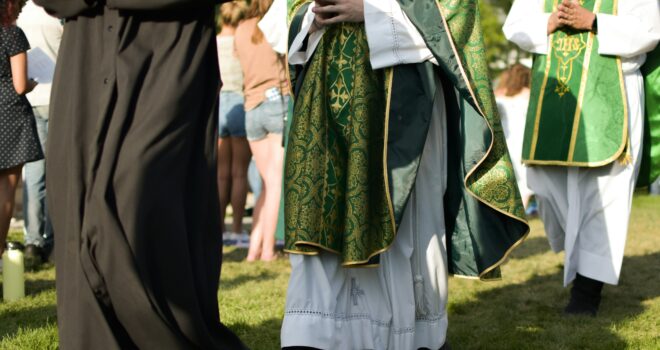Last night I was reflecting on the whirlwind of confusion that followed in the wake of the DDF’s release of Fiducia supplicans (On the Pastoral Meaning of Blessings). The mainstream media seemed to completely miss the point of this decree, often suggesting that it did the exact opposite of what it said. Commentors in my social media feed talked about how confusing and ambiguous the document was (and wondered whether it was calculatedly so).
But, to me, the text seemed straightforward and clear. I’ll be the first to admit that ambiguous statements are a hallmark of the Francis pontificate, but Fiducia supplicans isn’t ambiguous. So why the confusion?
Some of it is willful, I am sure. People have agendas.
Much of it, it occurs to me, probably has to do with what people assume is implied by a blessing. The meaning of blessings is, after all, what this directive is all about — not marriage or sexual morality.
In the secular world, a blessing is often understood as a sign of approval. To “give your blessing” is considered the same as giving permission. Understood in these terms, the idea of blessing couples in same-sex unions would seem to indicate a paradigm shift in how the Church views homosexual relationships, even if we don’t call them “marriages.”
But that’s simply not what the Church means by “blessing.”
Anyone familiar with the many forms of blessing offered in the Catholic Church, both within and outside the context of liturgy, should understand this. Anyone who has read the introductory text of the Book of Blessings should understand this. Anyone who has read what the Catechism of the Catholic Church says about blessings should understand this. As I said, some of the misrepresentation of this text is no doubt willful.
So what does the Church mean by “blessing?” The Catechism defines a blessing simply as “a prayer invoking God’s power and care upon some person, place, thing or undertaking.” Praying for God’s care upon a person or persons in no way requires or need imply approval of every aspect of that person’s life. Jesus instructs the Church to bless even those who persecute her (cf. Lk 6:28). You can (and should) bless a person immersed in sin without blessing the sin.
So why are we having this discussion in the context of same-sex relationships?
Dubia Part 1
Back in 2021, the Dicastery for the Doctrine of the Faith responded to a dubia (question): Does the Church have the power to give the blessing to unions of persons of the same sex?
Their response was: Negative.
It is typical for the responses to such dubia to be a single-word: affirmative or negative. In this case, however, the response was followed up with an explanatory text. That text explained that
when a blessing is invoked on particular human relationships, in addition to the right intention of those who participate, it is necessary that what is blessed be objectively and positively ordered to receive and express grace, according to the designs of God inscribed in creation, and fully revealed by Christ the Lord.
“For this reason,” it went on to say, “it is not licit to impart a blessing on relationships, or partnerships, even stable, that involve sexual activity outside of marriage,” which it defined as, “the indissoluble union of a man and a woman open in itself to the transmission of life.”
Note: the above deals with blessings of relationships.
It then points out that this “does not preclude the blessings given to individual persons with homosexual inclinations, who manifest the will to live in fidelity to the revealed plans of God as proposed by Church teaching,” recalling that while God “does not and cannot bless sin,” He always “blesses sinful man.”
This latter point deals with the blessings of persons.
Dubia Part 2
In September of this year, Pope Francis himself responded to a series of dubia submitted by five cardinals, one of which again dealt with the question of blessing same-sex unions. In his response, Pope Francis reiterated the Church’s perennial teaching on marriage, saying, “The Church has a very clear understanding of marriage: it is an exclusive, stable, and indissoluble union between a man and a woman, naturally open to the generation of children.”
In speaking of the uniqueness and importance of marriage, he said that “the Church avoids any type of rite or sacramental that might … imply that something that is not marriage is being recognized as marriage.”
He then went on to speak of the need for pastoral charity saying,
pastoral prudence must adequately discern whether there are forms of blessing, requested by one or more persons, that do not convey an erroneous conception of marriage. For, when one asks for a blessing, one is expressing a petition for God’s assistance, a plea to live better, and confidence in a Father who can help us live better.
In other words, the responses to both of these dubia were clear: sexual relationships outside of marriage cannot be blessed, but this doesn’t mean that people in such relationships cannot be blessed.
Why would Pope Francis insist on including that second point, which may seem to many to just be common sense? Doesn’t that just muddy the waters on what should be a clear-cut matter? Well, the reality is that it’s not common sense for everyone, and this Pope has a special heart for reaching out to those on the margins.
So what, then, are those “forms of blessing … that do not convey an erroneous conception of marriage” the Holy Father is speaking of? This is the question that Fiducia supplicans isintended to address.
No Quasi-marriage Ritual
Fiducia supplicans goes to great lengths to dispel any idea that the “forms of blessing” under discussion may in any way resemble marriage or imply some sort of parallel rite or equivalency.
Consequently, it specifies that these blessings may not be:
- ritualized
- liturgical
- anything resembling a liturgy
- imparted in relation to a civil union
- include anything (including words, gestures and even clothing) proper to a wedding
Blessings for Everyone
So what sort of blessings are we talking about? The directive specifically mentions those blessings which the Church routinely offers to everyone without imposing requirements.
There are several occasions when people spontaneously ask for a blessing, whether on pilgrimages, at shrines, or even on the street when they meet a priest. By way of example, we can refer to the Book of Blessings, which provides several rites for blessing people, including the elderly, the sick, participants in a catechetical or prayer meeting, pilgrims, those embarking on a journey, volunteer groups and associations, and more. Such blessings are meant for everyone; no one is to be excluded from them (paragraph 28).
It is within this context that the DDF discusses
the possibility of blessings for couples in irregular situations and for couples of the same sex… In such cases, a blessing may be imparted that not only has an ascending value but also involves the invocation of a blessing that descends from God upon those who — recognizing themselves to be destitute and in need of his help — do not claim a legitimation of their own status, but who beg that all that is true, good, and humanly valid in their lives and their relationships be enriched, healed, and elevated by the presence of the Holy Spirit (paragraph 31).
In order to avoid confusion and scandal, such spontaneous blessings should not in any way resemble a wedding ritual, the text explains, but should be offered in other contexts, including
a visit to a shrine, a meeting with a priest, a prayer recited in a group, or during a pilgrimage. Indeed, through these blessings that are given not through the ritual forms proper to the liturgy but as an expression of the Church’s maternal heart — similar to those that emanate from the core of popular piety — there is no intention to legitimize anything, but rather to open one’s life to God, to ask for his help to live better, and also to invoke the Holy Spirit so that the values of the Gospel may be lived with greater faithfulness.
In other words, the types of blessing under consideration here have nothing to do with marriage, or legitimizing anyone’s lifestyle, but are instead meant to invoke God’s aid in helping souls overcome obstacles in their life to draw closer to Him.
How would this not cause scandal?
But how, some have wondered, could a blessing be imparted upon any same-sex couple in a way that would not create scandal and confusion? It may be difficult to envisage such a situation if we approach the matter only in the context of same-sex unions. This is why Fiducia supplicans goes to such great lengths to distance the blessings it speaks of from even the impression of a wedding. Instead, we should imagine other occasions a priest or deacon may, in the context of ministering to people, desire to invoke God’s favor upon them.
I can think of several examples. I’ll offer only two, which will serve to illustrate what I believe the DDF and Pope Francis have in mind (at least according to my charitable reading of the text).
- You are a pastor. A couple makes an appointment to meet you to talk about their interest in Catholicism. They arrive at your office at the appointed time. You discover that they are a same-sex couple who have been together for close to ten years. They have been civilly married. One was raised Catholic, but ceased to practice the faith in any meaningful way after his parents divorced when he was only eight years old, shortly after he received his first Holy Communion. The other was raised conservative Baptist but was kicked out of his church’s youth group when he came out in high school and has had a bad taste in his mouth for religion ever since.
They have gone decades without Christ having any meaningful part in their lives. But lately they have felt like something is missing. They together have come to realize that something is God. After talking about the faith traditions they grew up with, they found themselves drawn to the ritual and beauty of Catholicism. They have done some reading, listened to some podcasts, and have started reading the Bible. They are at the point where they want to learn more — but they know the Church’s stance on homosexual relationships and have a lot of uncertainty about what moving forward would mean for them. They are looking for guidance.
You spend about an hour listening to their story. You praise their search for God and acknowledge the difficulties they are facing. You offer to speak openly and honestly with them about the Church’s teachings any time they like and encourage them not to be afraid of the challenges that may come. You extend an invitation for them to meet with you again. Before they leave, you ask if you can pray for them. They say please. You pray for their discernment, for clarity, for courage, and that their hearts may be open to God’s will. And you bless them. - You are a parochial vicar. You get called to the hospital late at night. A teenager was in an auto accident. He’s a student at the local Catholic high school. You don’t know him, but you are told he is Catholic, he is seriously injured, and in critical condition.
You arrive at the hospital to anoint him. When you arrive, you find three adults by the young man’s bedside: his father, his mother, and another woman. You learn that his parents are divorced and the mother is in a same-sex relationship with the other woman. It’s been this way for several years. All three care deeply for the boy and are overcome with worry.
After anointing the young man, you offer words of comfort and compassion to the three adult caregivers. You pray with them, and you ask God to bless them in this moment of trial.
I can think of many more such situations, none of which should cause scandal, none of which remotely resemble weddings, and none of which bless a morally illicit union — and none of which were forbidden before this DDF directive came out.
Now I am not naive, and I am sure many will use this directive as an excuse to do exactly what the directive itself prohibits. So if the text doesn’t give any new permissions, why was there a need to issue it at all, some may wonder?
First, because the question of blessing same-sex unions keeps popping up (and the Church keeps saying “no” and will continue to reiterate that point).
And second, because there are a lot of people — not just those in same-sex relationships, but others in irregular marital situations — who believe themselves to be entirely outside the scope of the Church’s pastoral care and this is simply not true.
Whatever your situation in life, if you sincerely desire to draw closer to God, there is always a way forward. It may not be an easy way, but this is precisely why God’s blessings, administered through the pastoral care of His Church, are so necessary.
Editor’s note: this article was originally published on Dcn. Matt’s blog, and is reprinted with permission.
Photo by Reiley Costa on Unsplash












